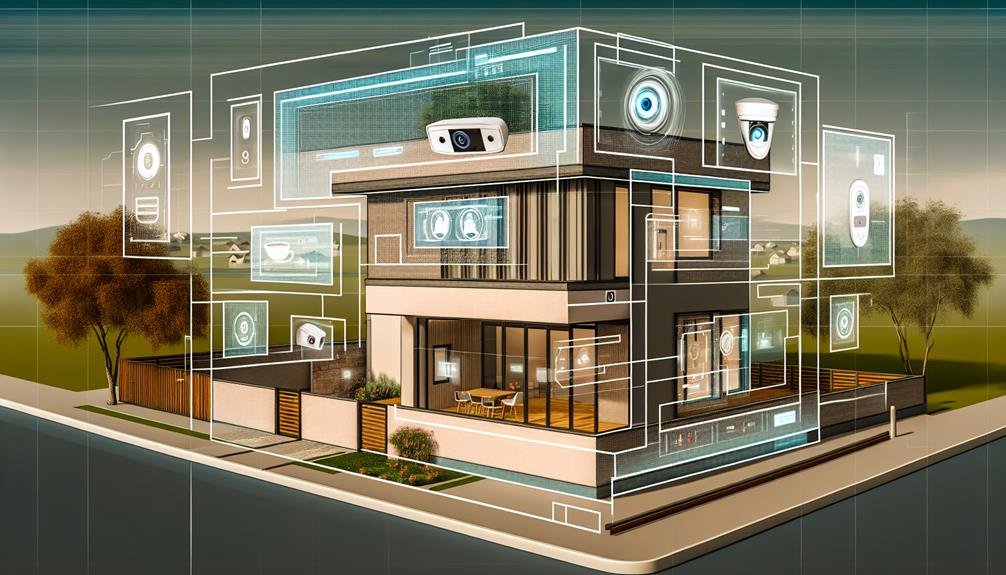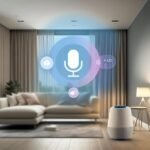Imagine a fortress, guarded by an army of technology, always vigilant and ready to protect. That's the power of smart home automation when it comes to improving home security and surveillance.
From smart locks that enhance your door's defenses to intelligent cameras that keep an eye on every corner, the possibilities are endless.
But how exactly does it work? And what does the future hold for this cutting-edge technology? Get ready to discover the answers as we unravel the secrets of smart home automation, where security and peace of mind meet innovation and convenience.
Key Takeaways
- Smart home automation offers numerous benefits for enhancing home security and surveillance, including the ability to remotely monitor and control home security, access security cameras and receive alerts, and optimize energy usage for improved efficiency.
- Smart locks provide convenience and enhanced security with keyless entry, encryption, and real-time alerts, allowing homeowners to grant access to trusted individuals remotely and ensuring peace of mind.
- Smart cameras and doorbells offer improved monitoring capabilities, providing live video feed and communication with visitors. They can be accessed remotely on smartphones or tablets, ensuring that the home is protected at all times.
- Integrating motion sensors adds an extra layer of security with alarms and instant notifications. They can also automate lights when motion is detected, creating the illusion of an occupied home and integrating with voice control devices for added convenience.
Benefits of Smart Home Automation
One of the key benefits of smart home automation is the ability to remotely monitor and control various aspects of your home's security. With remote monitoring, you can keep an eye on your home even when you're not there physically. This gives you peace of mind and a sense of freedom, knowing that you can check in on your home at any time. Whether you're at work or on vacation, you can use your smartphone or computer to access security cameras, receive alerts about suspicious activities, and even lock or unlock doors.
Another advantage of smart home automation is improved energy efficiency. With smart thermostats and lighting systems, you can easily control and optimize your home's energy usage. For example, you can set your thermostat to automatically adjust the temperature when you're not at home, saving energy and reducing utility bills. Similarly, you can schedule your lights to turn on and off at specific times, ensuring that they're not left on unnecessarily. By monitoring and controlling your home's energy consumption, you have the freedom to create a more energy-efficient and cost-effective living environment.
Enhancing Home Security With Smart Locks
Enhance the security of your home with the use of smart locks, which provide convenient and secure access control. Smart locks offer keyless entry, allowing you to eliminate the need for traditional keys and the risk of losing them. With remote access capabilities, you can control and monitor your smart locks from anywhere using your smartphone or tablet.
Here are three benefits of enhancing your home security with smart locks:
- Convenience: Smart locks simplify the process of entering and exiting your home. You no longer have to fumble with keys or worry about forgetting them. With keyless entry, you can unlock your door using a PIN code or biometric authentication, such as a fingerprint or facial recognition, providing quick and effortless access.
- Enhanced Security: Smart locks offer advanced security features that traditional locks lack. They utilize encryption and authentication protocols to prevent unauthorized access. You can also receive real-time alerts on your smartphone whenever someone enters or exits your home, allowing you to stay informed and take immediate action if necessary.
- Remote Access: With remote access, you can remotely lock or unlock your doors, even when you're not at home. This feature is especially useful for granting access to trusted individuals, such as family members or service providers, without the need to physically be present.
Investing in smart locks is a smart choice to enhance the security of your home. With keyless entry and remote access, you can enjoy the convenience and peace of mind that comes with knowing your home is protected.
Enhancing Home Surveillance With Smart Cameras
Improve your home surveillance by incorporating smart cameras into your security system. Smart cameras are an essential component of a modern home security setup, providing you with enhanced monitoring capabilities and peace of mind. With their advanced features and remote access capabilities, these cameras offer a convenient and effective way to protect your property.
One popular type of smart camera is the smart doorbell, which not only allows you to see who's at your door but also provides you with a live video feed. This allows you to monitor your front door remotely and even communicate with visitors through the built-in two-way audio. Some smart doorbells also come with motion sensors and night vision capabilities, ensuring that you have a clear view of any activity happening outside your home, day or night.
In addition to smart doorbells, there are also standalone smart cameras that you can place strategically around your property. These cameras can be easily integrated into your existing security system and offer features such as high-resolution video, motion detection, and cloud storage for recorded footage.
With remote access capabilities, you can view the live feed from your smart cameras on your smartphone or tablet, no matter where you are. This means you can keep an eye on your home even when you're away, giving you greater control and peace of mind.
Incorporating smart cameras into your home security system is a smart choice for anyone who desires freedom and wants to enhance their home surveillance capabilities. These cameras provide you with the ability to monitor your property remotely and ensure that your home is protected at all times.
Integrating Motion Sensors for Added Security
Integrating motion sensors into your home security system adds an extra layer of protection by detecting and alerting you of any movement in and around your property. These sensors are designed to detect changes in infrared radiation caused by the movement of objects, such as humans or animals.
Here are three reasons why integrating motion sensors is beneficial for your home security:
- Enhanced Security: Motion sensors can trigger alarms and send instant notifications to your smartphone or security monitoring service when any motion is detected. This allows you to take immediate action and notify the authorities if necessary, ensuring a quick response to potential threats.
- Smart Lighting Integration: By integrating motion sensors with your smart lighting system, you can automate the lights to turn on when motion is detected. This not only increases visibility but also creates the illusion of an occupied home, deterring potential burglars.
- Voice Control Integration: Motion sensors can be integrated with voice control devices like Amazon Alexa or Google Assistant. This enables you to control and monitor your motion sensors using voice commands, providing you with a convenient and hands-free way to manage your home security.
Integrating motion sensors into your home security system not only adds an extra layer of protection but also enhances the overall functionality and convenience of your smart home.
The Future of Smart Home Automation for Home Security
The future of smart home automation for home security is centered around seamless integration and advanced artificial intelligence (AI) technology. AI advancements have the potential to revolutionize the way we secure our homes, offering a higher level of protection and convenience. However, with these advancements come privacy concerns that need to be addressed.
| AI Advancements | Privacy Concerns |
|---|---|
| Facial recognition technology can identify known individuals and alert homeowners of any unauthorized access attempts. | Data privacy and security need to be prioritized to prevent unauthorized access and potential misuse of personal information. |
| Machine learning algorithms can analyze patterns and behaviors to detect anomalies and alert homeowners of potential security threats. | Clear guidelines and regulations must be in place to ensure that AI systems are not used for intrusive surveillance or violate privacy rights. |
| Voice recognition technology can provide secure access control, allowing only authorized individuals to interact with the smart home system. | Transparent data collection practices should be implemented to build trust and reassure homeowners that their personal information is handled responsibly. |
| Predictive analytics can anticipate potential security breaches based on historical data, enabling proactive measures to be taken. | Regular audits and assessments of AI systems should be conducted to identify and mitigate any potential vulnerabilities or biases. |
The future of smart home automation for home security holds great promise, but it is crucial to balance the benefits of AI advancements with addressing privacy concerns. By implementing transparent and responsible practices, homeowners can enjoy the freedom of a secure and convenient smart home experience.






